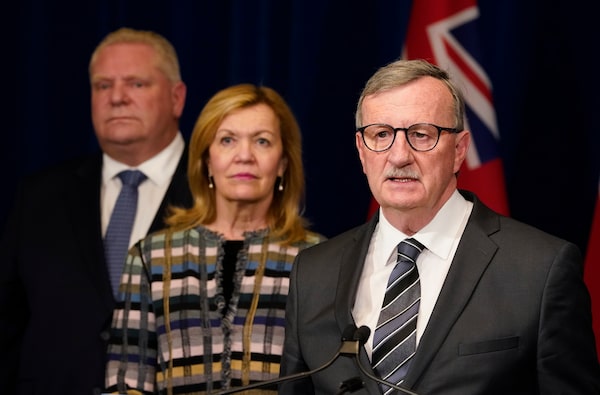
Dr. David Williams, Ontario's Chief Medial Officer of Health, speaks as Ontario Premier Doug Ford and Health Minister Christine Elliott look on at an announcement declaring a state of emergency for the province, at the Ontario Legislature in Toronto on March 17, 2020.Frank Gunn/The Canadian Press
Ontario’s Chief Medical Officer of Health stands by his communications during the COVID-19 pandemic and says he wouldn’t change how he’s handled the public health emergency, even as some in the medical community call for new leadership.
In an interview with The Globe and Mail, Dr. David Williams said he has tried to be as clear as possible in the face of complicated data from 34 public health units.
“Sure, I would like everything all nice and neat and tidy and perfect. When you’re dealing with the complexity of Ontario, it’s not like that," he said. "We’re trying to be transparent, straightforward … we don’t do it with any spin. It’s as it is.”
The province’s top doctor was thrust into the spotlight as Ontario struggled at times to reach its daily testing capacity and the novel coronavirus devastated dozens of long-term care homes.
Some infectious-disease experts have been critical of his oft-times meandering public statements, as well as what they characterize as a lack of vision in the pandemic response.
“He can’t communicate his way out of a wet paper bag,” said David Fisman, an epidemiologist at the University of Toronto’s Dalla Lana School of Public Health. “We need generational shift.”
But Dr. Williams said he has received many e-mails and letters of support. “The rest of the public is saying, you’re the only one speaking to us that we clearly understand what’s going on.”
He has also earned the Premier Doug Ford’s praise. “He’s been working his back off,” Mr. Ford said recently.
Dr. Williams, a 69-year-old grandfather of soon-to-be four, was approaching retirement when he was appointed in 2016 by the Liberal government to a five-year term, ending next February. He previously served as a medical health officer for almost two decades in Thunder Bay, and worked in First Nations and Nepal. According to Ontario’s public-sector salary disclosure, Dr. Williams was paid nearly $414,000 last year.
His role is complex. He works with 34 health units, but they do not report directly to him. He is a quasi-officer of the legislature, but he also reports to the deputy minister of health, the Health Minister and cabinet. He is a manager, running a division of the government, and he sets out guidelines for the province’s pandemic response by conferring with numerous others.
Asked whether he would change anything about his actions – whether clarifying rules around March break travel, expediting long-term-care testing or acknowledging community spread – Dr. Williams said, “No, not really.”
“You can make decisions by waiting too long … you can cause issues by making them too soon," he said. “It has huge implications. You want to make sure you have your best advice at the time, knowing that never any decision is going to be perfect.”
As to whether he would pursue a regional approach to reopening the province, Dr. Williams simply said local public health officers are doing “a great job” of talking to their communities.
Some medical experts, however, say that Ontario’s response has fallen flat, owing in part to Dr. Williams – but also what they identify as an underfunded and bureaucratic public health system.
“His job is equally an impossible one,” said Andrew Morris, medical director of the anti-microbial stewardship program at the Sinai Health System in Toronto. Dr. Morris and others have been pushing for an outsider to come in and serve as the Premier’s point person and chief communicator for the pandemic.
Janine McCready, an infectious-diseases physician at Toronto’s Michael Garron Hospital, said it is “discouraging” that Ontario’s case numbers have not fallen as quickly as in British Columbia or Alberta.
“You really just need to feel that there is an overarching plan...I think that is a little bit of the frustration and the challenge and maybe the disappointment that a lot of us feel.”
The province’s pandemic communications were in the spotlight again this week, when Mr. Ford pleaded with anyone who attended a crowded Toronto park over the weekend to get tested for COVID-19. But Dr. Williams’s associate chief medical officer of health, Barbara Yaffe, later said people should self-monitor for 14 days and don’t necessarily need a test “at this point.”
Dr. Williams said he doesn’t see a contradiction – only a caveat.
“I don’t think there was totally 180 difference,” he said. "It’s not that the Premier said left, and we said right.”
Our Morning Update and Evening Update newsletters are written by Globe editors, giving you a concise summary of the day’s most important headlines. Sign up today.
 Laura Stone
Laura Stone